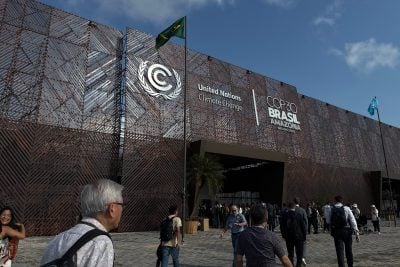In late February, when Africans living in Ukraine hurried their way to safety as Russian jets and infantry began their assault on Ukraine, African governments and institutions began scrambling to contain the economic fallout that President Putin’s war will cause. Experts are predicting an inflation and food price spike will hit Africa later this year, as agricultural imports and supply chains in the region are blocked, and fertiliser and commodity prices soar.
The black soils of Ukraine and Russia, rich in minerals and organic carbon, are one of the world’s most important breadbaskets, with roughly 25% of the world’s wheat exported from Russia and Ukraine, according to the Observatory of Economic Complexity (OEC).
Wheat imports account for roughly half of Africa’s $4.5bn trade with Ukraine, and for about 90% of the continent’s $4bn trade with Russia, according to figures from the African Development Bank (AfDB). Over 65% of Senegal’s wheat imports come from Russia and Ukraine, and a number of bakers and consumers in Dakar told African Business they are bracing for supply shortages and increased costs in the months ahead. At the same time, East Africa gets 90% of its imported wheat from Russia and Ukraine, according to the World Food Programme.
In Africa, wheat provides 14% of the calories consumed, and with rapid urbanisation and increased use of bread as part of a staple diet for many Africans, that number is projected to double by 2050.
“We have countries like Congo, Tanzania, Senegal and the Democratic Republic of Congo, that all have above 50% of their total wheat imports coming from Russia. Whether this upheaval is something that is going to last for years or months we don’t yet know, but this is definitely a serious crisis in the short term,” says Alex Smith, a food and agriculture analyst at environmental think tank the Breakthrough Institute.
Ukraine’s winter crops are reportedly still in good condition, and will be harvested where possible in early April, following a record 86m tonnes of grain harvested in autumn 2021.
Ukraine’s President Volodymyr Zelensky said in March that the country must sow as many crops as possible in the coming weeks as Ukraine’s export potential gets significantly undermined by the conflict. Farmhands have been made refugees as rural villages emptied out. Export logistics are also a major challenge – scores of Ukrainian cargo ships are currently blocked at Black Sea ports by the Russian Navy, as Putin attempts to strangle Ukraine’s economy.
Russia is itself the world’s leading wheat exporter but on 15 March, Moscow announced a halt to exports of wheat, rye, barley, and maize to ex-Soviet countries in a bid to prevent domestic supply shortages. The move followed Western and European sanctions against Putin that shredded the rouble, impacting Russia’s purchasing power in international markets.
Impact of sanctions
Expanding Russia’s export ban cannot be ruled out, although Putin still enjoys the diplomatic support of several African presidents, while others tentatively hedge their bets, waiting to see how the war unfolds, and if Putin maintains his grip on power.
The ban on Russia from the Swift global payments system could mean it might struggle to sell products like wheat and oil on major global commodity markets.
For Africa’s leaders, tough decisions are being made about whether to subsidise the rising price of wheat and other agricultural imports. Africa increased its wheat production when the price of wheat on world markets rose 130% during the global food crisis between 2007 and 2008, says Alison Bentley, global wheat director at the International Maize and Wheat Improvement Centre (CIMMYT). Expanding production will be an important mitigator of the self-reliance within the region once again.
“I think there’s a different potential to pay those high subsidies,” says Bentley, “so it may have an impact on food security in places like Rwanda, where you have very, very small domestic wheat production.
“You could also argue they have relatively low wheat demand but it is still a component of the staple crops that provide calories and dietary protein to the population. All food import economies in Africa are going to see an effect on their own budget position, their foreign exchange costs, and their availability to keep bread prices stable.”
The CIMMYT coordinates projects to enhance smallholder wheat productivity in places like Rwanda, Zambia and Ethiopia, by helping farmers increase yields, sow improved varieties of wheat, and fight wheat diseases like wheat rusts. For the AfDB, weaning Africa off of its Russian agricultural goods dependence is now a top priority.
President Akinwumi Adesina has announced a $1bn fund to increase the production of wheat, rice, soybeans and other crops to feed 200m Africans. Increased mechanisation, financing, and utilisation of climate-resistant technologies will be deployed to help 40m African farmers. Adesina announced the fund the same week in March that the United Nations warned food costs could surge 22% as the war chokes international trade, further stifling Africa’s post-Covid economic recovery.
Food prices in many African countries skyrocketed even in the months before the Russian invasion of Ukraine, as increased shipping costs and supply bottlenecks failed to return to pre-Covid levels. A supermarket in The Gambia says prices of wheat flour have risen by 15% in a year, while prices for cooking oil have increased by a third.
Can Africa increase food production?
As Africa experiences price hikes, questions are being raised as to how the continent can increase its own food production.
“The reason why Africa is in general dependent on agricultural imports is often about the relative efficiency of agricultural production. But potentially these initiatives in response to the war, which require more capital intensive agricultural reform, maybe some land reform, could spark Africa to deploy greater inputs in their agricultural production, in the way Ethiopia is intensifying,” says Alex Smith.
Ethiopia could be the harbinger for a paradigm shift in agricultural production in Africa. The country has increased its farming mechanisation, which has meant wheat yields have doubled over the last 15 years, according to government data, as prime minister Abiy Ahmed targets wheat self-sufficiency by 2023.
Ethiopia’s fertile soils help produce crops accounting for 35% of the national economy, while occupying 73% of the workforce. But the country can’t yet keep up with accelerating wheat demand, so millions of dollars of imports are needed to bridge the gap, straining foreign currency reserves, says Alison Bentley.
Ethiopia signed an agreement with Morocco in 2021 for a new fertiliser project located in gas-rich Dire Dawa, in northern Ethiopia, to provide greater food security, marking an important step towards expanding fertiliser production on the continent.
For sub-Saharan Africa’s 14 wheat producing countries, the uncertainty of fertiliser supplies imported from Russia is a major concern. In South Africa, 35% of input costs come from fertilisers, and the country is Russia’s 36th largest fertiliser market. Rising fertiliser prices following the sanctions placed on Russia could reduce Africa’s productivity and yields for the foreseeable future.
Boon for oil and gas producers
Yet the ripple effects of the war could produce some unintended long-term economic positives for Africa’s oil and gas producers. In countries like Angola and Nigeria, rising oil and gas prices could mean boosted foreign earnings as the conflict drives crude oil past $100 per barrel once more.
If Moscow shuts off its gas exports, or further sanctions cripple exports, then Africa could be presented with an opportunity to step in and meet demand, says Kelly-Ann Mealia, founder of Energy Capital and Power.
“Coming to a conclusion that the EU-Russia relationship is coming to an end is premature, but Africa on the whole is under-explored in terms of oil and gas. Africa will have its biggest growth in gas between now and 2050, with 420bn cubic metres coming online, which will open export markets, but this isn’t going to be an immediate thing. The best case scenario we’re talking about is 12 to 18 months to begin stepping up supply to Europe,” Mealia says.
The war will likely change international investors’ attitudes to oil and gas exploration in Africa, says Mealia, and could provide fresh impetus to establishing a trans-Saharan gas pipeline from Nigeria to Algeria.
It is an attempt to diversify the EU’s gas supplies, and increase Africa’s gas exports, but the project has been beset with problems ranging from insecurity to opposition in Nigeria by groups in the Niger Delta producing region.
For Alice Gower, director of geopolitics and security at London-based think-tank Azure Strategy, North Africa’s ability to supply Europe with added gas will be hampered given limited Algerian production. Tensions between Algeria and Morocco also continue to impact supplies carried though the high capacity Maghreb-Europe Gas Pipeline, linking gas to Spain and Portugal.
“The most realistic option for Europe right now is to try to obtain existing LNG cargoes originally destined for elsewhere, although this would require deft negotiations with Asian buyers and would undoubtedly come at a price premium. Algeria has to meet its domestic and contractual obligations and at best, could only increase production by a fraction, but even this is threatened by political and economic instability,” says Gower.
Want to continue reading? Subscribe today.
You've read all your free articles for this month! Subscribe now to enjoy full access to our content.
Digital Monthly
£8.00 / month
Receive full unlimited access to our articles, opinions, podcasts and more.
Digital Yearly
£70.00 / year
Our best value offer - save £26 and gain access to all of our digital content for an entire year!
 Sign in with Google
Sign in with Google 



